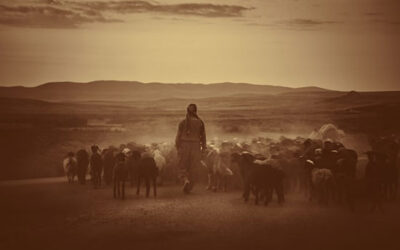Joseph is one of the more well-known people from the Bible’s Old Testament. He showed remarkable strength, faith, and patience—even while facing great difficulty and injustice. All because he let God lead.
There’s a lot we can learn from his story that we can apply to our lives today. Let’s look at four areas of his life that show him relying on God—when most of us would have acted quite differently!
- Joseph as a son and brother at home
- Joseph as a slave in Egypt
- Joseph as a governor in Egypt
- Joseph’s reconciliation with his family
His story unfolds in Genesis chapter 37.
Joseph’s life as a son and brother at home

Photo by Liane Metzler on Unsplash
One of the first things the Bible tells us about Joseph is that his “home life” was complicated. Dysfunctional, even.
He was the son of Jacob, one of the founding fathers of the nation of Israel. He also had 11 brothers and one sister.
Joseph was his father’s favorite son. And it was no secret.
The Bible records one particular act of favoritism where Jacob gives Joseph (and only him) a fancy, coat of many colors.
Needless to say, he was a target of envy and resentment among his brothers. They “hated him and could not speak peacefully to him” (Genesis 37:4, ESV).
There were three reasons his father loved him so much. Here’s some background:
- We’re told in verse 3 that Jacob “loved Joseph more than all his children, because he was the son of his old age” (NKJV). So Joseph was a son that came along when Jacob was probably beginning to think the childbearing years had passed.
- It’s also highly likely that Joseph acted like a favored child would. He followed the household rules, and he was a tattle-tale who would bring “a bad report of [his brothers] to his father” (Genesis 37:2) while out tending the flocks of sheep with them.
- But the primary reason was because he was the firstborn son of Jacob’s favorite wife, Rachel.
If we backtrack to Genesis 29, we see how Jacob was about to marry Rachel. He worked for her father, Laban, for seven years before Laban would give her away in marriage.
But Laban tricked Jacob into marrying Rachel’s older sister, Leah, and then Jacob had to work for Laban another seven years so he could marry Rachel.
By the time Jacob’s family began to expand, he had ten sons by three other wives. (Rachel and Leah’s maidservants also bore children for Jacob,)
But Rachel had remained barren through the years. Finally, she had two sons: Joseph and Benjamin (Genesis 29:15; 30:24; 35:22–26).
So, Joseph was Rachel’s long awaited firstborn son. And Jacob couldn’t help but love him excessively.
What lesson can we learn from Joseph’s story about his family relationship?
It’s not hard to see that favoritism causes rifts in any community—especially a family. It ultimately leads to rivalry when there would have been love and support among the siblings.
When parents make every effort to treat their children equally, these situations can be avoided. And God is always there to help when parents pray for guidance and strength.
Joseph’s dreams

Image by David Mark from Pixabay
When Joseph was 17, he had two God-given dreams that changed his life. They showed that he would have a great future.
In the first dream, Joseph and his 11 brothers were harvesting grain. Suddenly, his brothers’ bundles bowed down to his bundle of grain. This meant he was going to reign over his brothers someday (Genesis 37:7–8).
In his second dream, he saw the sun, moon, and 11 stars bow down to him. Again, this meant that each member of his family would bow in submission to him in the future (Genesis 37:9–10).
(And you can imagine that they didn’t take too kindly to this information when he told it to them…)
The Bible tells us that as a result, “his brothers envied him” (Genesis 37:11, NKJV).
And in no time, they “conspired against him to kill him” (Genesis 37:18, NKJV).
And that opportunity soon presented itself. One day, Joseph visited them where they were taking care of their father’s flock, and this was far away from home.
They intended to kill him, but his elder brother Reuben suggested otherwise. Instead of committing murder, they should put him in a dried-up well that he couldn’t escape.
Then they ended up selling him to slave traders, who sold him in Egypt.
Meanwhile his brothers covered up their crime by soaking Joseph’s fancy, colorful robe in an animal’s blood. Then they lied to Jacob that he had been killed by a wild animal.
This greatly devastated his father (Genesis 37:12–35).
But here’s where the story of Joseph takes a dramatic change. While in the land of Egypt, away from his tense family environment, God used him in amazing ways.
We’ll soon see how his dreams were fulfilled.
What can we learn from Joseph’s dreams?
Two things:
1. It is always a great blessing for someone to know their calling early in life. We can enjoy a profound sense of purpose to start working toward it, letting God lead.
So when God opens a door, let’s consider it a privilege to walk through it!
2. Whenever we have dreams or ambitions (even divine callings), we need to be careful in choosing who to tell these things to. And we should never brag.
In the case of Joseph, it probably wasn’t the wisest of choices to tell his brothers his dreams right away. He knew his brothers resented him, yet he went ahead and told them about his bright future and the possibility of him ruling over them.
Because of this, his jealous brothers were determined to ensure it never happened.
However, God did use the situation as a way to show the rest of Joseph’s family that when He calls someone, He follows through.
Life of Joseph as a slave in Egypt
Here we get a glimpse of one of the most powerful examples of the temperament of a faithful believer.
Once in Egypt, Joseph was sold to “Potiphar, an officer of Pharaoh” (Genesis 37:36; 39:1, NKJV).
In a few days, his status had completely changed. He went from being the most favored child at home to a slave in a foreign country. His future was uncertain, and his life’s ambitions were seemingly shattered.
But he still trusted in God, whom his father Jacob taught him about.
In Potiphar’s house
The Bible says that even in slavery, God was still with Joseph. He became so successful in everything he did that his master noticed (Genesis 39:2–5).
Eventually, he trusted Joseph so much that he “left everything he had in Joseph’s care; with Joseph in charge, he did not concern himself with anything except the food he ate” (Genesis 39:6, NIV).
How about that! Even though a lowly slave, Joseph didn’t grumble and complain. He didn’t demand justice or refuse to work.
Instead, he went above and beyond. In the most unfavorable of circumstances.
(This is an excellent example of what the apostle Paul talks about in Ephesians 6:7–8, when he encourages believers to “serve with a good attitude, as to the Lord and not to people, knowing that whatever good each one does, slave or free, he will receive this back from the Lord” [CSB]).
But Joseph’s time in Potiphar’s house was not without difficulty.
Apart from his work ethic and success, Joseph was also very handsome. And Potiphar’s wife noticed. She persistently made advances toward him (Genesis 39:6, 7, 10).
But he refused, saying, “How then can I do this great wickedness and sin against God?” (Genesis 39:9, NKJV).
Then one day he ran away when she tried to grab onto him. But she had a grip on his clothes, and he “left his garment in her hand and fled and got out of the house” (Genesis 39:12, ESV).
Then Potiphar’s wife falsely claimed that Joseph had tried to rape her, using that piece of his clothing as evidence.
And so, innocent though he was, Joseph ended up in prison (Genesis 39:19–20).
What lessons can we learn from Joseph’s time in Potiphar’s house?
First and foremost, whatever life throws at us, God can equip us to cope with dire circumstances and still be a blessing to others.
Tragic things may happen to us. But if we continue to trust Him and follow His plan for us, we will notice His blessings even in difficulty.
Secondly, as in the case of Joseph and Potiphar’s wife, there is no excuse for sin. Even under the strongest temptation we can still trust God to ultimately deliver us (1 Corinthians 10:13).
Scripture can be our safeguard against falling into sin (Psalm 119:11).
Like Joseph, let’s be bold to faithfully stand for what is right, even when we’re being dealt with unfairly.
Even though Joseph could have made a big fuss, he decided to maintain his integrity and loyalty to his master and to God. He would’ve rather go to prison than to act in an ungodly manner.
Joseph’s time in prison

Photo by Denny Müller on Unsplash
Even though wrongfully imprisoned, Joseph did not let that affect His faith in God or His conduct toward others. This is amazing considering how a “normal” person would act in similar circumstances today.
He was put where the “king’s prisoners were bound” (Genesis 39:20, NKJV).
And again, God was with him and all that “he did the LORD made to prosper” (Genesis 39:21, 23 NKJV).
In no time, he was assigned as leader of his fellow prisoners.
Among the prisoners were the king’s chief cupbearer and the king’s baker.
These two men had prophetic dreams like Joseph (Genesis 40:5, Genesis 40:16–17).
They became depressed because they didn’t know what the dreams meant. So Joseph told them that God had the power to help him interpret them, and he did (Genesis 40:6–8).
The dreams meant that the cupbearer would be reinstated to his position after three days while the baker was going to be hanged after three days (Genesis 40:12–13; 18–19).
And everything happened exactly as predicted.
Joseph asked the cupbearer to remember him and tell Pharaoh about his case. He hoped he could help him get out of prison. But the cupbearer forgot about Joseph (Genesis 40:14, 20–23).
Then two years later, Pharaoh himself had disturbing dreams that no one could interpret. That’s when the cupbearer finally remembered Joseph. And he was called out of prison to interpret Pharaoh’s dream (Genesis 41:1–14).
When asked to interpret the dreams, Joseph again gave God the glory, saying, “It is not me: God will give Pharaoh an answer of peace” (Genesis 41:16, NKJV).

Photo by Sergey Semin on Unsplash
Pharaoh dreamt of seven cows that came up out of the Nile River; they were and happy, grazing on the nearby grass. But then seven scrawny, ugly cows came out of the river and ate the fat cows.
No wonder Pharaoh was perplexed and troubled.
Joseph relayed that the dream meant seven years of good harvest followed by seven years of famine (Genesis 41:25–32).
Then Joseph, filled with God-given wisdom, proposed a detailed solution to the problem. During the time of abundance, they should grow as much food as possible and store up any extra. This surplus would then help provide for them during the seven years of drought (Genesis 41:33–36).
After that, Pharaoh appointed Joseph as his deputy and a governor in Egypt, so he could implement the plan (Genesis 41:37–45).
At this time, Joseph was only but 30 years old.
What lessons can we learn from Joseph’s time in prison?
1. First, we learn the importance of having a positive attitude even in difficulty.
Not only did Joseph do great things while still a prisoner but he also did so with a humble, gentle disposition. He didn’t whine, complain, or keep carrying on about how it wasn’t fair. Instead he trusted God and kept his composure.
When you think about that, it’s truly amazing. It goes against almost every fiber of human nature and self-preservation!
2. Even while going through difficult times, we can still help others. That could even be the way God uses to get us out of the problem.
We’ve seen how God used Joseph’s genuine concern for his fellow prisoners to help him. His gift of interpreting dreams was discovered when he used it to help others.
3. God often gives us gifts and abilities to cultivate from a young age, which can be useful to us later. Just like He did with Joseph who had his first prophetic dreams as a teenager.
4. We will inevitably be disappointed by people—but never have to lose faith in God. He’ll come through for us at the right time, probably in an even better way than we could have imagined.
When the cupbearer forgot about Joseph after leaving prison, that must have been disappointing. Joseph could have been waiting each day for someone to come down and release him!
But even though it took more time, instead of being released to become a slave again, this time he became a governor!
5. All the talents and gifts we have come from God (James 1:17). And like Joseph, we should always be careful to give God all the glory for the things He does through us.
6. God’s plan for our lives will always come to pass no matter what obstacles we face.
Joseph was sold off by his brothers, imprisoned by Potiphar, and forgotten by the cupbearer. But even so, God’s plan of making him a ruler still came to pass.
7. Lastly, faith in God is not based on circumstances. Like Joseph, we can still have faith in God even when things turn from bad to worse.
Facing adversity in life doesn’t mean God isn’t working with us. We can see ourselves as gold being refined by fire, with these difficult life experiences deepening our faith (1 Peter 1:7).
Joseph’s life as the governor of Egypt

Photo by Gabriela Fechet on Unsplash
Seeing the wisdom in the proposed plan, Pharaoh gave Joseph all the resources and power to implement it accordingly (Genesis 41:33–36).
So during the seven years of plenty, he accumulated food and stored it safely in storehouses (Genesis 41:46–49).
Then when the famine hit, there was enough food for the people of Egypt. In fact, there was enough to sell to the neighboring countries!
“All countries came to Joseph in Egypt to buy grain, because the famine was severe in all the lands” (Genesis 41:57, NKJV).
By the end of the famine, the people appreciated him saying, “You have saved our lives” (Genesis 47:25, NKJV).
What can we learn from Joseph’s time as the governor of Egypt?
Here we learn leadership lessons and the importance of strategy.
We’ll look at three in particular:
1. Whenever we identify a problem, we should always look up to God for a solution.
2. If we are entrusted with a task, we should be faithful to our duty, despite how we feel about it.
“And whatever you do, do it heartily, as to the Lord and not to men” (Colossians 3:23, NKJV).
Pharaoh completely trusted Joseph with the job. Even when the people came to him for food, he said to all the Egyptians, “Go to Joseph; whatever he says to you, do” (Genesis 41:55, NKJV).
3. Leadership qualifications are not always based on high academic standards or charismatic popularity. From Joseph’s experience, we see that it’s all about integrity, truthfulness, trust in God, and the desire to help solve people’s problems.
Joseph was also very humble, which is not very common with political leaders. He never sought glory for himself and always credited God for his accomplishments.
Joseph’s reconciliation with his brothers and care for his family
By now, the seven years of famine were in effect. And among those who went to buy food in Egypt were Joseph’s brothers (Genesis 42:1–5).
When they arrived, they bowed before the governor, not knowing it was their own brother (Genesis 42:6).
Joseph noticed it was them, and as they bowed, he remembered his first dream many years ago. But he didn’t say anything to them. Not yet.
Remembering how they betrayed him, he didn’t trust them right away. Instead, he tested them to see if they’d changed. He also wanted to know how his father and little brother, Benjamin, had fared in their hands (Genesis 42:7– 44:34).
After he was convinced that they weren’t the envious schemers they’d been, he revealed himself to them (Genesis 45:1–3).
Then he let them know he had forgiven them, and that it was all part of God’s great plan to “preserve life” (Genesis 45:5, NKJV).
And with Pharaoh’s support, he settled His father and brothers in Egypt. That way, all his family escaped the famine (Genesis 46–47:12).
After his father Jacob died 17 years later, Joseph’s brothers became worried that Joseph may seek revenge. But he assured them saying:
“Do not be afraid, for am I in God’s place?
As for you, you meant evil against me, but God meant it for good in order to bring about this present result, to keep many people alive.
So therefore, do not be afraid; I will provide for you and your little ones” (Genesis 50:19–21, NASB).
And instead of being harsh, “he reassured them and spoke kindly to them” (Genesis 50:21, NIV).
What can we learn from how Joseph treated his brothers and family?
1. Joseph gives us a great example of familial love and tenderness.
His love for his father, his youngest brother Benjamin, and even the brothers who sold him was still unconditional after all he’d been through.
2. We should always forgive those who’ve wronged us—even if we think they don’t deserve it.
“Forgive others not because they deserve forgiveness, but because you deserve peace.”
-Jonathan Lockwood Huie
“If possible, so far as it depends on you, live peaceably with all” (Romans 12:18, NIV).
3. And when we have the opportunity for reconciliation, we need to be wise in how we go about it. This will ensure we aren’t taken advantage of.
That’s why Joseph took his time to observe his brothers before revealing himself to them.
4. We should not try to take revenge on those who have hurt us, even if we’re in a position to. As the apostle Paul advises:
“Never take your own revenge, beloved, but leave room for the wrath of God, for it is written: ‘vengeance is Mine, I will repay,’ says the Lord” (Romans 12:19, NASB).
5. We should always take care of our families, especially our aged parents, when God blesses us.
As we’ve seen, all of Joseph’s dreams came true!
And though it took a long time, and many obstacles to overcome or wait out, Joseph continued to trust God. He remained patient and faithful. And he perfectly maintained his integrity.
We don’t read anywhere that he ever complained. Even when treated unfairly, he didn’t become bitter or depressed. Instead, he seized every opportunity to help and serve others.
From Joseph, we see that even in our toughest moments, we can still find strength and hope in God. He can turn our obstacles into stepping stones for our next great move (Jeremiah 29:11).
And we can be comforted that even if God’s plan for our lives might seem like it’s taking a long time, it will surely come (Habakkuk 2:3).
Joseph’s story and other stories in the Bible were “written for our learning, that we through the patience and comfort of the Scriptures might have hope” (Romans 15:4, NKJV).
Though they were written many years ago, they teach us timeless principles to help us navigate a selfish and deceitful world.
“All these things happened to them as examples, and they were written for our admonition, upon whom the ends of the ages have come” (1 Corinthians 10:11, NKJV).
More Answers
Major Fulfilled Bible Prophecies You Should Know About
Prophets seem like something from novels or movies.
Judges of Israel and lessons we can learn from them
Times of crisis call for men and women of action. The Israelites, newly settled in the Promised Land, found themselves in those times. As enemy nations attacked and oppressed the tribes, they cried out to God for help. He, in turn, sent them men and women of action—known as judges.
What Is the Statue in Nebuchadnezzar’s Dream?
Ever had a dream you couldn’t remember? You know it was disturbing, but the details escape you. Ugh, the frustration!
What Are the Three Angels’ Messages in Revelation 14?
Revelation 14 in the Bible depicts three angels flying swiftly to the earth with important messages for the world right before Christ returns.
All About the 2300-Day Prophecy and the Investigative Judgment
Daniel 8:14 introduces us to the longest prophetic timeline in the Bible—the 2300-day prophecy. So what does it mean? When does it start and end, and why’s it so important?
What Is the 70-Week Prophecy in Daniel 9
Could a prophecy accurately predict an event over 500 years before it was supposed to happen?
The Creation of the World: What the Bible Really Says
When we think about the biblical Creation story, we think of just that: the world being created by the Creator. And while God’s creation of the world is marvelous and miraculous in its own right, it’s about far more than the sudden appearance of plants, animals, and humans.
Individual or Group Bible Study—Which Is Better?
They’re both great, of course! But depending on where you’re at and what your goals are, it’s worth looking into the different benefits of each.
Who Were the Israelites in the Bible?
The Israelites in the Bible, also known as the children of Israel or ancient Israel, were a nation God called to represent Him to the world. They come from the line of Abraham, whom God first made a covenant with, promising to make his descendants into a great nation (Genesis 12:1-3).
Bible Translations
Bible Translations—Which English Language Version is “Best”?The most accurate Bible possible would be one that’s printed in its original languages—Hebrew and Greek. But since most of us are not Hebrew or Greek scholars, the next best option is to find a Bible...
What’s the History of the Bible? A Complete Overview
The Bible is the number one bestseller in the world of all time.1 It’s translated into thousands of languages, read by people of all ages and backgrounds.
false vs true prophets
Have you ever wondered how people in Bible times were able to tell if their prophets were actually from God?
What Are the Beatitudes (And What Do They Mean)?
The Beatitudes, found at the beginning of Jesus’ Sermon on the Mount in the Gospel of Matthew, are Jesus’ kingdom manifesto. They describe the way His kingdom works and what it means to be one of His followers.
What Is the Fruit of the Holy Spirit in the Bible?
When we cultivate our relationship with Jesus, the Holy Spirit gives us traits that help us in our day-to-day activities and interactions. These are the fruit of the Spirit.
Healing in the Bible
Have you ever felt like healing seemed so far away? Like it wouldn’t be possible for you? What you most want is a glimmer of hope or a bit of encouragement.
Faith and Works—Do Both Matter in the Christian Life?
In so many religions all throughout time, individuals work toward enlightenment, salvation, or the favor of a deity. People are taught subtly—or not so subtly—that if you only do enough good deeds, you’ll be worthy/ascended/redeemed/approved, etc.
Does the Bible Teach Predestination?
Do your choices, actions, and habits really matter to your eternal destiny? Or is the path you choose in life predetermined, and your life is just following a script that’s been laid out for you?
The Armor of God as Described in Ephesians
In Ephesians 6, the Apostle Paul was helping people understand what it means to defend themselves within a spiritual war (Ephesians 6:10-18).
The Story of Moses in the Bible: What His Life Teaches Us
A baby on death row, an outcast prince, a humble shepherd, and an unlikely deliverer. All these titles describe the individual that led Israel out of slavery in Egypt to the borders of the Promised Land.
The 42 Kings (and 1 Queen) of Israel and Judah in the Bible
Ever wondered who all the kings of Israel and Judah in the Bible were? Meet all 42 (plus 1 queen) and learn profound, unexpected lessons from their stories
What We Can Learn from the Life of Joshua
Joshua was an iconic leader in the Old Testament of the Bible. As a successor to Moses, he was both a humble servant of God and a strong warrior. God called Him to lead the nation of Israel to take possession of Canaan, the Promised Land—a task he took on with faith and courage.
Why is Abraham Important in the Bible?
Abraham is known for being the first patriarch of the Hebrew people.
King David: How Was He a Man After God’s Own Heart?
War, bloodshed, murder, adultery—all of these crimes overshadowed the life of a biblical Old Testament man named David. Yet he was called a man after God’s own heart, not to mention one of Israel’s greatest heroes and kings.
Is the Old Testament Important for Christians Today?
Yes, the Old Testament is important because it kicks off the story that is continued by the New Testament. Without it, we wouldn’t have the vital background to Jesus’ first coming and the other accounts of the New Testament.
What Does the Bible Say About the End Times?
First of all, when we say “end times,” this refers to the period of time that precedes the second coming of Jesus—and the end of this sinful world before it’s recreated into the new earth. And several passages of Scripture provide us with clues and guidelines to help us recognize when these times are near, what kinds of things we can expect, and what it might mean for our daily lives and priorities.
Why Do Some Bibles Have More Books Than Others?
Christians consider the Bible as their sacred writings. But within Christianity, different denominations use Bibles with different numbers of books.
Didn’t find your answer? Ask us!
We understand your concern of having questions but not knowing who to ask—we’ve felt it ourselves. When you’re ready to learn more about Adventists, send us a question! We know a thing or two about Adventists.


























